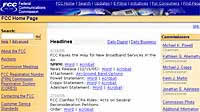 A US appeals panel has challenged new federal rules which require certain video devices to incorporate technology designed to prevent copying digital television programs and distributing them over the Internet.
A US appeals panel has challenged new federal rules which require certain video devices to incorporate technology designed to prevent copying digital television programs and distributing them over the Internet.
US Appeals Judge Harry T Edwards delivered a slap across the wrists of the Federal Communications Commission by saying that that it had “crossed the line” with its requirements for anti-piracy technology in next-generation television devices.
The anti-piracy technology, known as the broadcast flag, will be required after July 1st for televisions equipped to receive new digital signals. Many personal computers and VCR-type recording devices will also be affected.
The broadcast flag would permit entertainment companies to designate, or flag, programs to prevent viewers from copying shows or distributing them over the Internet.
Two of the three judges on the District of Columbia Circuit panel said the FCC had not received permission from Congress to undertake such a sweeping regulation, and questioned the FCC’s authority to impose regulations affecting television broadcasts after such programs are delivered into households.
“You’re out there in the whole world, regulating. Are washing machines next?” fumed Judge Harry Edwards. Judge David Sentelle was equally unimpressed: “You can’t regulate washing machines. You can’t rule the world.”
The groups challenging the FCC’s broadcast flag regulation include the American Library Association, the Association of Research Libraries, the Medical Library Association, Public Knowledge and the Electronic Frontier Foundation.
They argue that the FCC has over-stepped its authority, that Congress should be responsible for making copyright law, and that librarians’ ability to make “fair use” of digital broadcasts will be unreasonably curtailed.
Although the judges’ comments are encouraging for opponents of the Broadcast Flag, doubts have been cast whether their opponents have the legal standing to challenge the rule in court.
Either way, we can expect to wait a few months before the court issues a ruling. In the meantime, activist groups like the Electronic Frontier Foundation continue to offer consumers the means to get around the restrictions with their “HD PVR Cookbook,”.
Electronic Frontier Foundation
Federal Communications Commission